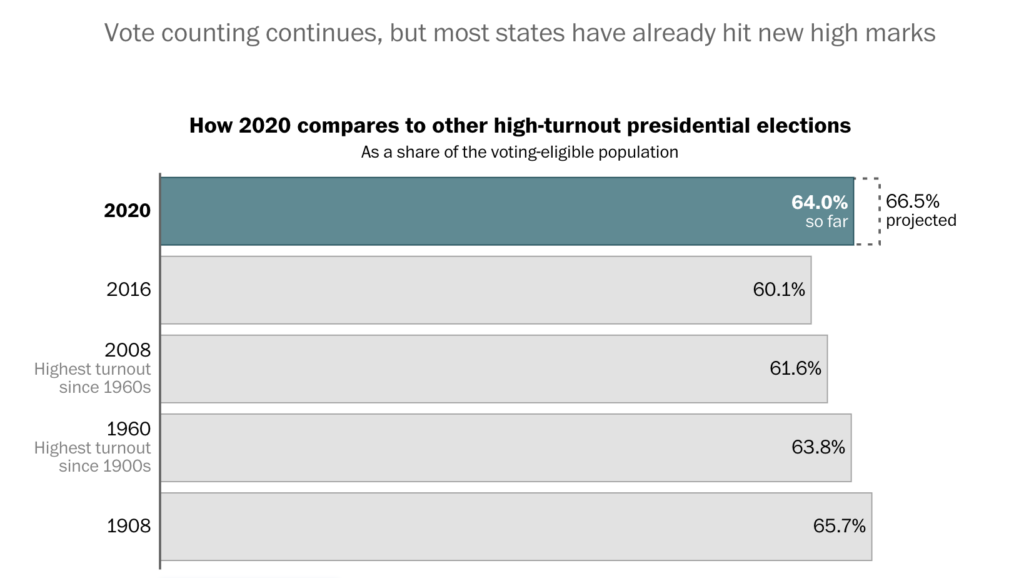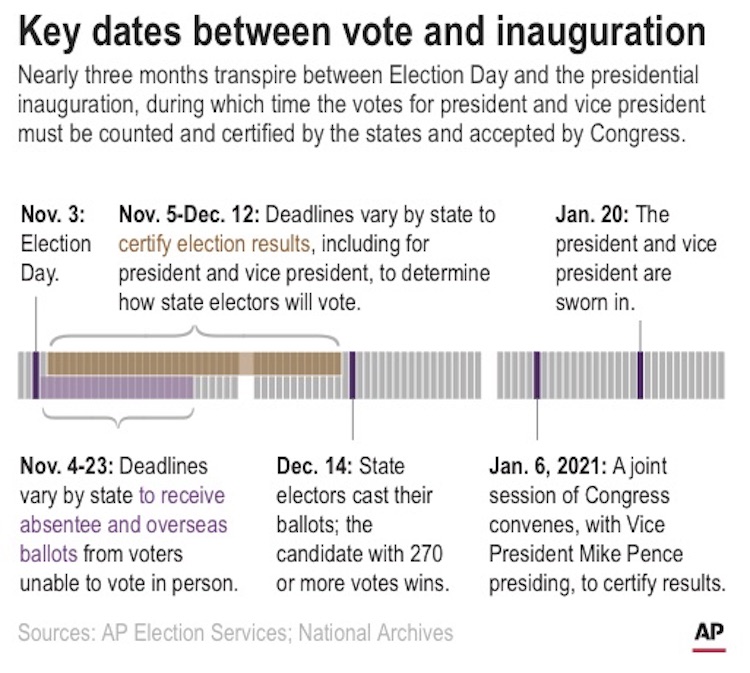What we know
The 2020 U.S. election saw the highest voter turnout in over 100 years with nearly 65% of the voting-eligible population casting ballots. Edison Research predicts that once all votes are tabulated, 2020 turnout will be the highest since 1900, when 73.7 percent of eligible Americans cast ballots.

Although the 2020 election results won’t officially be certified by the Election Division of each state until the second week of December, Former Vice President Joe Biden (D) is the projected president-elect. Sen. Kamala Harris (D-Calif.), is the first Black woman and person of South Asian descent to be elected as vice president-elect.
It was a historic year for women, with a record-breaking number of women now serving in the U.S. Congress. This year a record 227 Republican women filed to run for the House of Representatives and 94 became their party’s nominee.
Arizona, Georgia and North Carolina have yet to be called by news outlets, with Michigan, Pennsylvania and Wisconsin still tabulating razor thin margins. Litigation in many of those states could lead to further delay as both candidates fight to retain their electoral votes. (Read more on the Electoral College in our Policy Brief.)
Both of Georgia‘s U.S. Senate seats will be decided in run-off elections in January 2021. Senate Republicans are currently projected to hold 50 seats to Democrats’ 48, which means these two seats will decide partisan control of the U.S. Senate.
So what now?
The next President of the United States will take the oath of office on Inauguration Day, January 20, 2021. Before we can get to that, these key steps will happen first over the next two months:

Recounting the U.S. Presidential Election
A week after polls closed, all 50 states plus the District of Columbia are still counting votes – largely due to the huge increase in mail-in and absentee ballots this year. Most states have reported 98-99% of all votes cast. The most tightly contested battleground states have looming deadlines to meet within the next 10 – 20 days.
Meanwhile, President Trump and his allies have filed lawsuits alleging election irregularities or improper ballot-counting procedures in five states where President-elect Joe Biden leads. Here’s a state-by-state guide to post-election litigation.
Georgia’s Secretary of State announced last week that a recount would be held for the state’s presidential election due to a 0.2% vote difference between President Trump and Vice President Biden. This week they announced that the state will “hand audit” votes cast in the presidential election. The National Conference of State Legislatures has more on election recount rules, which vary state-by-state.
Speaking of Georgia…
The reliably republican state could be a crucial win/lose for either party in this election, with two runoff elections scheduled for both of the State’s Senate seats — which will also decide partisan control of the U.S. Senate..
Incumbent Republican Senators David Perdue and Kelly Loeffler will face Democrat challengers Jon Ossoff and Rev. Raphael Warnock, respectively, in run-off elections on January 5, 2021. Per Georgia law, a candidate must receive at least 50% of votes in order to win an election. If no candidate reaches that threshold, a runoff occurs automatically between the two candidates with the highest majority of votes. Georgia and Louisiana are the only two states that hold runoffs for general elections.
Why are both Senators being elected at the same time?
Georgia’s Senate seats aren’t normally up for grabs at the same time – they’re staggered like every other state. However, Senator Loeffler was running in a special election this year after being appointed to the Senate late last year, filling longtime Senator Johnny Isakson’s seat when he retired before his term was complete. Whichever candidate wins this race will serve out the duration of Isakson’s term through 2022.
There are a number of key dates to keep in mind leading up to Georgia’s January 5 runoffs:
- Immediately: Voters can request absentee ballots (no excuse required); 65+ and disabled absentee voters from general election automatically on runoff list
- November 18: First day counties can mail absentee ballots
- December 7: Runoff voter registration deadline December 14: In-person early voting begins
- January 1, 2021: Last day of in-person early voting; deadline for requesting absentee ballot
#CircleUP on This Topic
Host a conversation with your Circle on this topic using our U.S. Senate Policy Brief, which dives into legislative branch of our government, checks and balances and how the body operates. For even more, see our House of Represenatives Brief.
The Policy Circle is a 501(c)(3), nonpartisan organization that provides pathways for women to become courageous, knowledgeable and active citizens who identify and take ownership of local solutions to the issues facing their communities. Please consider supporting our mission and developing your own leadership skills by becoming a financial supporter.
Want to share your Policy Circle story? Email us at communications@thepolicycircle.org to learn how to get involved. And follow us on social: Facebook, Instagram, Twitter and LinkedIn.